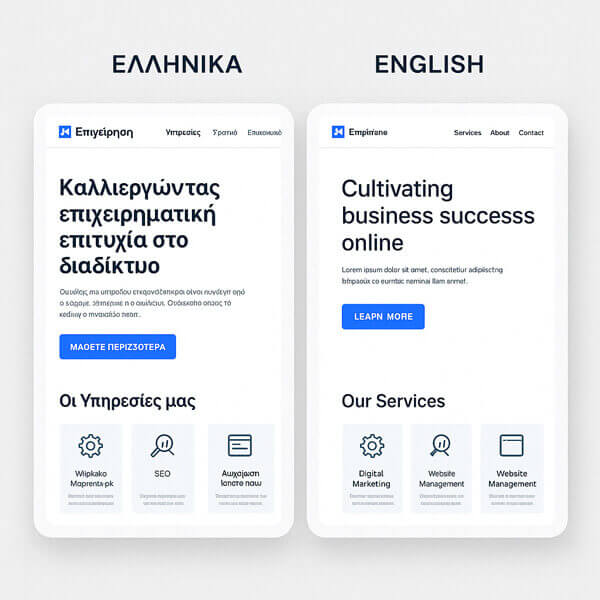How Greek Businesses Can Succeed in English-Speaking Markets

Expanding into English-speaking markets can seem daunting for Greek businesses — but it’s also one of the most effective ways to grow internationally. Whether you're selling physical products, professional services, or operating in tourism, tapping into markets like the UK, US, Australia, and Canada can bring exposure, trust, and real growth. But simply translating your website into English isn't enough.
This article outlines key strategies Greek companies should follow to successfully connect with English-speaking audiences — and avoid common pitfalls.
1. Think Beyond Translation
Many businesses begin their international push by translating existing Greek content into English. While this is a necessary step, it’s only the starting point.
Literal translations can often result in awkward or overly formal English that doesn’t reflect how native speakers actually communicate. What's more, UK English, US English, and Australian English all have subtle cultural and tonal differences that can affect how your message is received.
Speaking English fluently isn’t enough — you need to speak it culturally.
For example:
- A marketing message that works in Greece may sound too direct or even pushy in the UK
- British audiences often respond better to understatement and wit
- American buyers expect clear calls to action and benefit-driven headlines
Hiring a native-level English content writer or editor is a smart investment — and so is localising your SEO strategy (more on that below).
2. Rethink Your SEO for English-Language Markets
Google isn’t the same everywhere. Search habits, keywords, and competition vary dramatically between Greece and, say, the UK.
Here’s what you should adapt:
- Keyword research: Don’t just translate Greek terms — research what English-speaking users actually search for in your niche.
- Localised phrases: UK users might search "Holiday rentals in Naxos," while Americans might say "vacation homes in Greece."
- Competitor analysis: Look at your direct competitors in each region. What’s working for them? How do they structure content?
International SEO is about more than language — it’s about user intent and regional behaviour. Using tools like Ahrefs, SEMrush, or Google Search Console’s country filters can give you valuable insights.
3. Tailor Your Website Design & UX
Western audiences may expect:
- Faster-loading websites (especially in the US)
- Simpler navigation and more prominent calls to action
- Clear trust signals (reviews, contact info, clean design)
Make sure your site loads quickly, uses familiar UX patterns, and feels professional. This doesn't mean boring — but flashy design without clarity can hurt conversions.
Also, make sure your English contact information is clear — including location (if relevant), phone number with international code, and a professional email address.

4. Use English-Speaking Campaign Platforms Intelligently
Running Google Ads in English is an obvious step — but remember to:
- Use native copywriting (again: not translated slogans)
- Adjust ad scheduling and bidding based on time zones
- Choose platforms your audience actually uses (LinkedIn may work well for B2B, for example)
Also consider email campaigns, content marketing, and even remarketing in English-speaking countries — all tailored by region.
5. Don’t Pretend You’re Local — Be Proud You’re Greek
English-speaking audiences appreciate honesty and international identity. You don’t need to pretend your business is based in London or New York. Instead, highlight what makes your Greek identity special:
- Greek-made products
- Local expertise in tourism or Mediterranean markets
- Cultural insight they can’t get elsewhere
What matters is professionalism, clarity, and understanding your audience’s expectations.
Final Thoughts
Success in English-speaking markets isn’t about ditching your Greek brand — it’s about presenting it in the clearest, most relatable way for a new audience. With culturally tuned language, smart SEO, and a modern digital presence, Greek businesses can compete — and thrive — globally.

